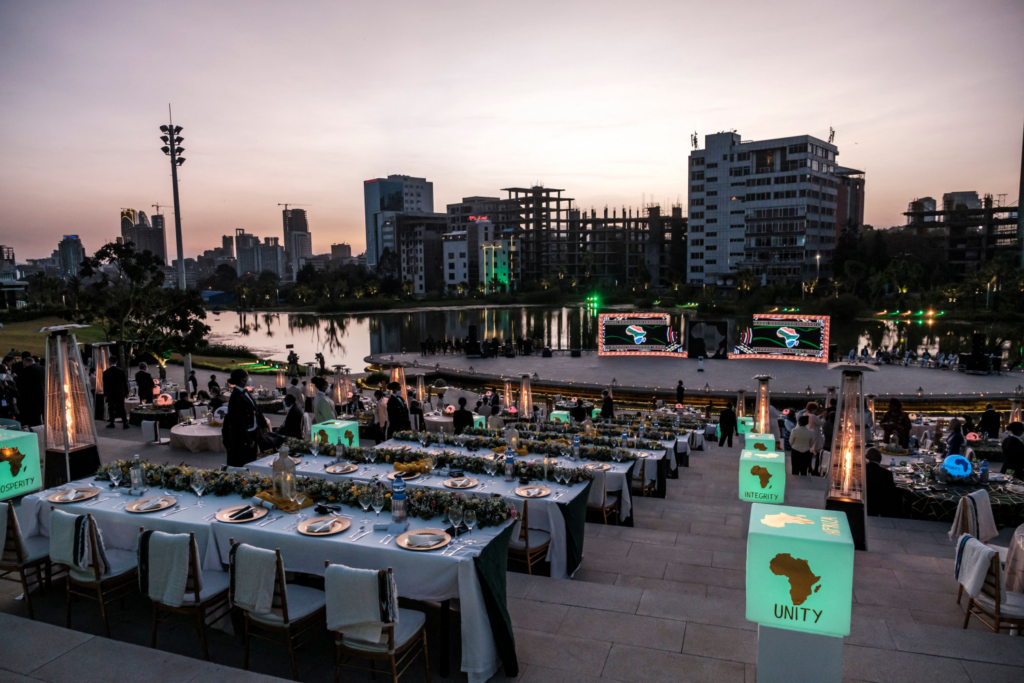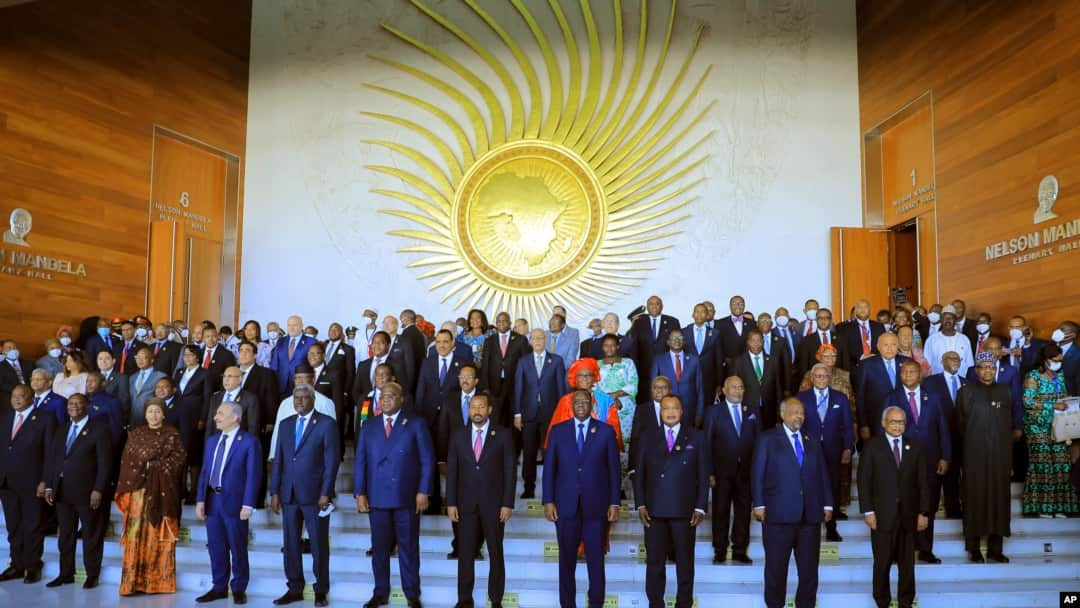•Turn the G-20 into the G-21 by adding the African Union.
By Hannah Ryder
From the G-20 to the United Nations, Africa’s agency and decision-making competence are hardly recognized—especially economically.
Considered as a region, as Europe often is, Africa is the world’s eighth-largest economy, and by 2063, the continent is aiming to become the world’s third largest. Put differently, that would mean growing to be the world’s Japan right now—and would put the continent ahead of the likes of Germany, France, India, and the United Kingdom in terms of economic might.
This fact has huge implications for the way the global economic decision-making order is structured now and by 2063. In such forums, African countries have often been seen as passive recipients of support or, at most, partners to consult with on specific questions. The idea that Africans might have interests beyond their own region, or a say in the global order, is rare. Hence, the international bodies that could benefit from African voices often exclude or marginalize them.
For instance, in the International Monetary Fund, just two executive directors contribute to significant global financial decisions on behalf of 46 African members (six of the other African countries, including Ghana, are represented by Middle Eastern regional directors, while Cape Verde is within a Latin America and the Caribbean grouping), while 22 other directors speak for the rest of the world. In the U.N. Security Council, no African country has a permanent seat, and instead African countries must change representation every two years for just three seats out of a total 15—disproportionate given that African member states comprise nearly 28 percent of the United Nations’ overall membership.
Even in the African Development Bank board, a simple majority decision can be achieved with just three of the nine African representatives, because of the voting power of the non-African representatives. The influential “Paris Club,” which has no African members but has made decisions on debt relief for numerous African countries, does not allow any borrowers in the room while decisions are being made.
The G-20 is a very special case, however, because while it also reflects this same marginalization of African countries—it includes just one African member, South Africa (now the continent’s third-largest economy, behind Nigeria and Egypt)—the G-20 has also granted regional membership to the European Union.
Created in 1999 shortly after the Asian financial crisis, 19 governments, plus the heads of the European Commission and European Council as a representatives for the EU region, have since met regularly to discuss and coordinate their internal financial and economic policies, with a view to having a stabilizing, positive effect on the rest of the world. Over time, the G-20 has coordinated on other types of policy areas. For instance, since the U.K. presidency in 2009, the G-20 has made agreements on climate issues—some of which were finally incorporated into U.N. negotiations as late as 2021. G-20 trade ministers’ meetings are now held regularly.
However, just like the work of the U.N. Security Council, where Africa is primarily the subject of its meetings, outcome documents, and resolutions, the G-20 has become increasingly proactive when it comes to Africa. The Chinese presidency in 2016 initiated work on supporting industrialization in African countries, while the German presidency in 2017 initiated the G-20 Compact With Africa to promote private investment into Africa. Most recently, in 2021, the Italian presidency hosted the first Africa Advisory Group.

The problem is, and just as in the U.N. Security Council, all these G-20 initiatives consign Africa to a passive, consultative, or at best diminutive role. Even the new “advisory group” has 12 non-G20 African members but is co-chaired by a non-African and includes institutions such as the IMF and OECD (the latter which has no African members), thus diluting the African voice.
This marginalization in decision-making matters. Despite its significance as the eight-largest economy, the African continent is marginalized in the current world order. The African Union’s 55 members, representing more than 1.3 billion people, together account for less than 4 percent of global trade, foreign direct investment, global emissions, and even public debt. When it comes to public goods, Africa is even further marginalized—3 percent of global vaccines supplied so far and 2 percent of renewable energy production globally. These outcomes are not just due to Africa’s own development levels; they are also due to international rules—discussed and agreed in rooms, such as those of G-20 hosts, that Africans are hardly represented in, if at all.
That means that while countries such as Italy, Canada, Indonesia, and Saudi Arabia all have smaller economies than the African region, through their G-20 memberships they are able to have direct impacts on global challenges that African nations—save for South Africa—cannot. Latin America and Europe each have at least three countries represented in the G-20, and the latter also has its own regional representative.
The regional representation is highly pertinent for Africa. Like the European Union, the African continent could easily be represented in the G-20 by the elected African Union Commission chair—currently Moussa Faki Mahamat of Chad—and the annually rotating chair of the AU, always an African head of state and is President Macky Sall of Senegal for 2022. The AU representatives could receive their mandate through the annual meetings of African heads of state in Addis Ababa, Ethiopia, which recently concluded. .
Furthermore, while the AU in economic terms is significantly smaller than the EU, and integration has arguably proceeded more slowly, member states’ goals in the annual meetings are typically formulated in regional terms under the Agenda 2063 banner, the continent’s overarching development plan. Under this plan, for instance, the continent has developed a major flagship project, the African Continental Free Trade Area—the world’s largest free trade area by membership—operational since January 2021 and which is expected to significantly boost economic growth and jobs across the continent.
Like the EU, the AU through its Agenda 2063 also envisions monetary union, as well as various infrastructural, policy, and cultural integration efforts. With a growing population, estimated to reach 2.5 billion by 2050, Agenda 2063 envisions the continent becoming the world’s hub for manufactured goods in the same way that China is now, albeit with a greener hue. The fact is, the continent has decision-making capacity—and its leaders know best how to harness this capacity, not only for the continent but also for the rest of the world.
African leaders have a great deal to offer global decision-making forums, beyond the continent’s pure economic potential or existing sources of economic growth, drawing on African business and citizens’ ways of working and experiences.
Take the environment. Africa does not just have large carbon sinks in the form of forests or vulnerability to climate change because of its current dependence on agriculture. The continent has a global offer. Estimates by the International Renewable Energy Agency suggest that Africa could supply 40 percent of the world’s solar potential and more than 10 percent of the world’s wind capacity by 2050.
Indeed, African countries are often ahead of others globally on key environmental issues—34 African countries have passed laws banning single-use plastic bags, and 30 are formally considering carbon neutrality by 2050 or earlier. Global environmental decisions would benefit hugely from this experience.
Governance models used in African countries also have lessons—for instance, Rwanda’s truth and reconciliation process is seen as a leading model for justice globally. And African leaders and scientists have been at the forefront of COVID-19 management, especially in the developing world.
For too long, the multilateral agenda has been set by others on behalf of Africa, despite the continent’s current global importance and its planned future. The recognition of Africa’s decision-making capacity and agency—for example, by becoming the 21st member of the G-20—could make a huge difference.
For Africa to realize African goals, African leaders must demand that their agency is embedded into the world’s current international relations structures. Otherwise, African countries may remain marginalized, never escaping the poverty traps that many outside the continent imagine are an inevitability and never realizing the AU’s Agenda 2063 vision. Equally, however, multilateralism will not improve without creating a stronger role and voice for African countries.Hannah Ryder is the CEO of Development Reimagined, Senior Associate at the Center for Strategic International Studies Africa Program, and former Head of Policy and Partnerships for UNDP in China.
Credit | Foreign Policy

